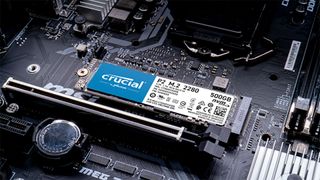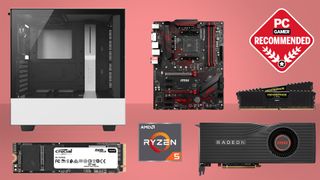The next wave of major videogames are going to be SSD storage hogs
Uninstall my unused steam games? Never!

Storage space will never cease to be a bugbear of modern gaming, at least not until streaming grips us all in its wispy cumulus claws. With games easily in excess of 100GB, if not 200GB in the case of Call of Duty: Modern Warfare, it only looks like that those storage demands are set to balloon with the coming wave of videogames. And you best be prepared for when they do.
The burgeoning storage cost of today's triple-As might mean that storage space, not strictly storage speed, is the real thing to look out for with the 'next-gen'. Sure, all this talk of SSDs taking over the next-gen consoles and engines with their super-fast NAND is enough to make any HDD-powered PC shudder, but it's the cost per GB for every major game that's going to have you on your knees praying to the cloud for sweet respite from this bit-conscious hell.
The only drawback I see is exponentially increasing the install size of the game, which even now is nearing 100GB or more for some titles.
Stephen Kick, CEO of Nightdive Studios
It's not like storage space hasn't been a precious commodity all this time, but at least that didn't come with an explicit demand for fast storage space. Sure, you'd be stuck in the loading screen for a while, but your humble HDD managed just fine as a Steam library in a pinch. If the onus of texture streaming falls onto your SSD with next-gen engines, such as that touted with Unreal Engine 5, there's more reason to opt for speedier solid state capacity over a spinning platter.
It was during a chat about Unreal Engine 5 that Stephen Kick, CEO of Nightdive Studios, warned me of the only drawback he expects from today's advancements, and that's "exponentially increasing the install size of the game."
You needn't look far to see the beginnings of that very trend: Call of Duty: Modern Warfare and Microsoft Flight Simulator. Okay, these are the biggest examples I could think of, and it's not like all games are quite so colossal in nature, but the expanding nature of game installs is bound to happen as the limitations of physical media are lifted and the high-res textures come flooding through.
But we'll suck that up if the game looks good, right? And at least NAND pricing has settled at a favourable low. Solid state drives have been dropping in price considerably since 2018, and means that you can pick up a half-decent SATA SSD for as little as $0.10/GB, and an NVMe drive for only a touch more.

Yet I still don't find myself rushing out to pick up 4TB of the stuff in Samsung's SATA 870 QVO drive at $500 (and that's far from the quickest SSD around).
The biggest gaming news, reviews and hardware deals
Keep up to date with the most important stories and the best deals, as picked by the PC Gamer team.
As ever, I resort to moving my data around, deleting games before their time, and continuously combing my applications list for any stragglers of a past attempt to get into professional audio mixing or what have you, in order to make room for another update or install.
But at least PCs offer the option to expand the storage with a high degree of flexibility and choice—reaching the limits of capacity is far more of an acute concern on console. The Xbox Series X comes with 1TB of storage, and the PlayStation 5 825GB. Both will reportedly feature a single expansion slot for further bytes beyond that.

Best CPU for gaming: the top chips from Intel and AMD
Best graphics card: your perfect pixel-pusher awaits
Best SSD for gaming: get into the game ahead of the rest
The Xbox Series X appears to be limited to 2TB at launch, internal and a single Seagate-made memory card, while the PlayStation 5 may be open to a greater span of NVMe SSDs and thus offer slightly more capacity with a little investment. Nevertheless, it's a deep-seated concern of mine that a handful of next-gen videogames would suck that storage capacity dry in an instant.
Now I will admit that those that favour their PC for gaming aren't as fortunate in that developers make special consideration for storage capacity to as great an extent as on console. Call of Duty: Modern Warfare's overall file size is far slimmer on console than it is on PC, which has recently seen the final file size balloon upwards of 200GB.
So I won't worry for consoles, they'll muddle through. And so too will those of us stuck to our PCs—albeit with a slight nervous twitch when a game install makes its demands on our directories.
Make no mistake, this isn't a call for game installs to be smaller. I want prettier, bigger, serviced videogames, and I know the price I've got to pay to get that. The market will adapt and shift to the needs of the consumer eventually, and storage that is both capacious and fast will eventually hit rock bottom price. It's how well our systems are going to hold up to the demands of modern gaming in the meantime that has me just a little worried.

Jacob earned his first byline writing for his own tech blog. From there, he graduated to professionally breaking things as hardware writer at PCGamesN, and would go on to run the team as hardware editor. He joined PC Gamer's top staff as senior hardware editor before becoming managing editor of the hardware team, and you'll now find him reporting on the latest developments in the technology and gaming industries and testing the newest PC components.
Most Popular


